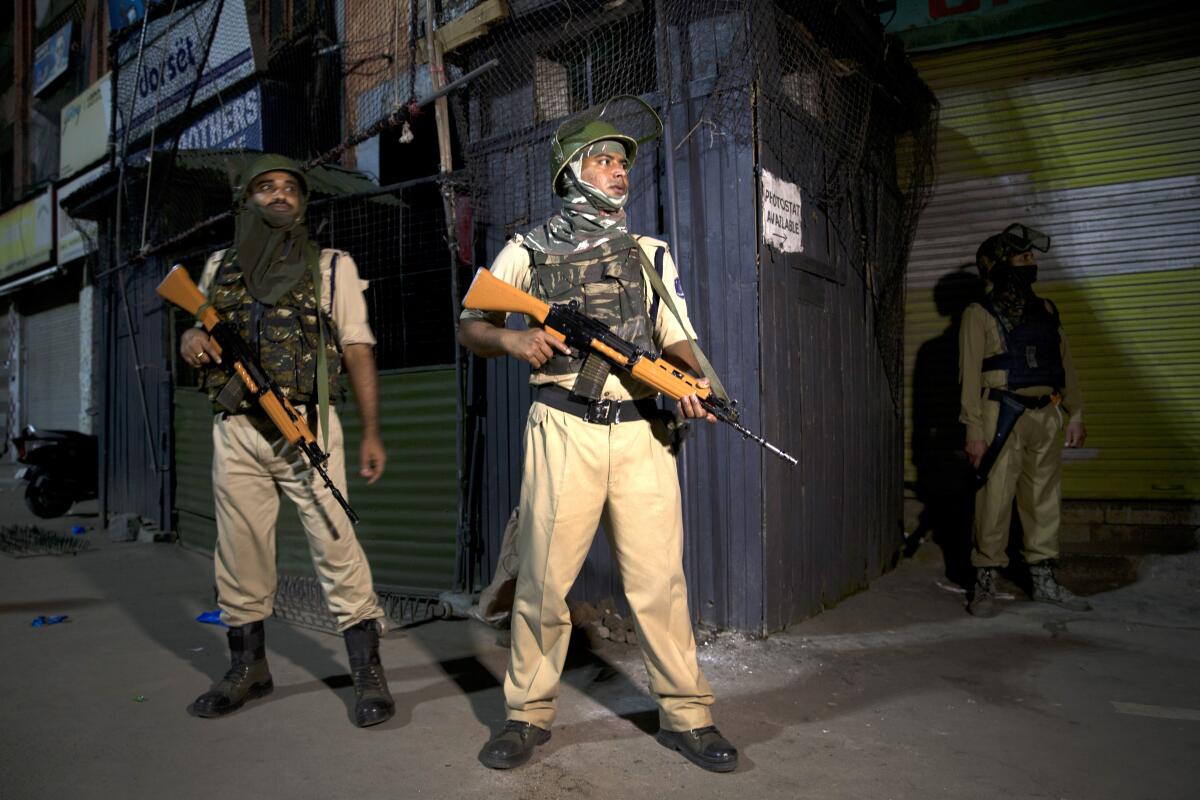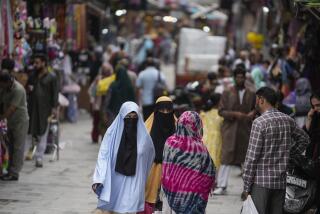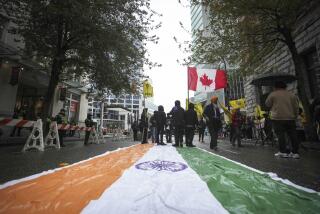India revokes Kashmir’s limited autonomy, raising tension in a long-turbulent region

- Share via
NEW DELHI — Tension built for 10 days in a Himalayan valley that is as scenic as it is turbulent.
In rugged Kashmir, India sent in thousands more troops without an official explanation. Authorities canceled a famed Hindu pilgrimage. Police trolled lakes and guesthouses to evacuate tourists. Schools were closed, phone and internet connections shut down and residents sheltered in their homes.
Then, on Monday, with most Kashmiris unable to follow the news, the Indian government announced a historic constitutional change, revoking the limited autonomy held for decades by its only Muslim-majority territory.
The controversial move to withdraw Kashmir’s special legal status fulfills a longstanding goal of Prime Minister Narendra Modi’s Hindu nationalist party to yoke the disputed northern territory more closely to the rest of India.
It also appears certain to heighten tensions with rival Pakistan – which also claims Kashmir – and trigger a violent backlash among separatist insurgents and civilians bitterly opposed to Indian rule.
“Today marks the darkest day in Indian democracy,” Kashmiri political leader Mehbooba Mufti tweeted, calling the change “illegal and unconstitutional.”
Modi’s top lieutenant, Home Minister Amit Shah, announced the presidential decree in Parliament, drawing angry outbursts from opposition members who argued the move violated the constitution and denied Kashmiris the right to self-determination promised to them for more than 70 years.
The decree, once approved by a legislature dominated by members of Modi’s party, will cancel Article 370 of the Indian Constitution, which grants the territory the right to its own constitution and bars outsiders from buying land, holding government jobs and receiving educational scholarships.
Removing those restrictions could pave the way for Hindu settlers to move into the area – a rugged landscape of snow-frosted mountains and rippling apple orchards – to dilute the Muslim population. Critics drew comparisons to Israel’s promotion of Jewish settlement in Palestinian territories.
“This latest move is only an attempt by the Indian state to try and change the demography of Kashmir such that it ceases being a conflict,” said Mudasir Amin, a Kashmir-based researcher.
The special protections date to the earliest days of India’s independence in 1947, when the new nation sought to bring the territory under New Delhi’s authority. Pakistan, which rules another portion of Kashmir, has gone to war with India twice over the region in the last seven decades.
Pakistan’s government said it “strongly condemns” India’s effort to change Kashmir’s status unilaterally, arguing that the bilateral dispute was a matter for the United Nations Security Council. In India, the legality of the presidential order was not immediately clear, and challenges to the move will almost certainly go to the country’s Supreme Court.
For supporters of Modi, who won a sweeping reelection victory in May but has been buffeted in recent weeks by reports of a slowing economy, the announcement sparked jubilation.
“What a glorious day,” the national general secretary of Modi’s Bharatiya Janata Party, Ram Madhav, tweeted. In the hours after the announcement, #KashmirHamaraHai, or “Kashmir Is Ours,” trended on Indian social media.
As part of the announcement, India said it was reorganizing the state known as Jammu and Kashmir, an 85,000-square-mile territory bordered by Pakistan to the west and China to the east. The state includes the disputed, 6,100-square-mile Kashmir valley, home to 5.5 million people.
Under the reorganization, the state would be downgraded to a union territory, giving New Delhi far greater control over its affairs, including authority over the local police.
The largest part of the state, the sparsely populated region of Ladakh, would be carved into a separate union territory, a move likely to be welcomed by the area’s residents, most of whom are Hindu or Buddhist.
Indian-ruled Kashmir had been on edge for days, starting when New Delhi sent thousands of additional paramilitary troops to the Kashmir valley – already one of the most heavily militarized zones in the world – without any formal explanation.
Local authorities then abruptly canceled the annual Amarnath Yatra, a Hindu pilgrimage to a remote cave in the Himalayan foothills, and ordered non-Kashmiris and tourists to leave immediately due to “the prevailing security situation in the Kashmir valley.”
The unusual move fueled speculation that the government was about to announce a decision on the state’s special status. Many of Kashmir’s residents stocked up on supplies and medicines.
On midnight Monday, the communications lockdown went into effect and local authorities passed orders restricting people’s movement. Two former chief ministers of the state – Mufti and Omar Abdullah – as well as politician Sajjad Lone were placed under house arrest.
Tariq Ahmad, who leads houseboat tours on Dal Lake in the main city of Srinagar, said police officers approached him Friday morning and asked his Indian guests to leave immediately.
“It was an absolute panic,” Ahmad said. “Never in the years of turmoil in Kashmir have tourists been forcibly evicted like this.”
Hours later, after the announcement in Parliament, it remained unclear whether many Kashmiris had learned of the decision. Experts expected large public protests despite the security presence, and said that Pakistan could foment further violence by firing artillery shells across the border and supporting attacks by militants.
“Within the Kashmir valley, there will be opposition leading to heightened and prolonged unrest, including increased activities of the terrorist groups,” said Sameer Patil, a security analyst with Gateway House, an Indian think tank.
The U.S. Embassy in New Delhi said U.S. citizens in the state “are strongly advised to leave as soon as possible and to exercise great caution until they depart.”
Special correspondent Iqbal reported from New Delhi and Times staff writer Bengali from Singapore. Special correspondent Aoun Sahi in Islamabad, Pakistan, contributed to this report.
More to Read
Sign up for Essential California
The most important California stories and recommendations in your inbox every morning.
You may occasionally receive promotional content from the Los Angeles Times.











